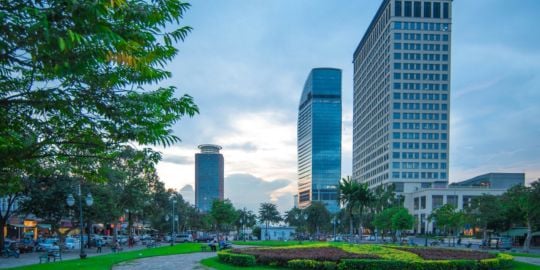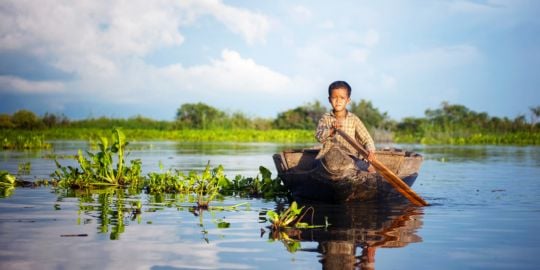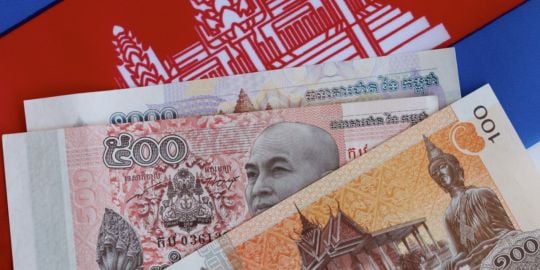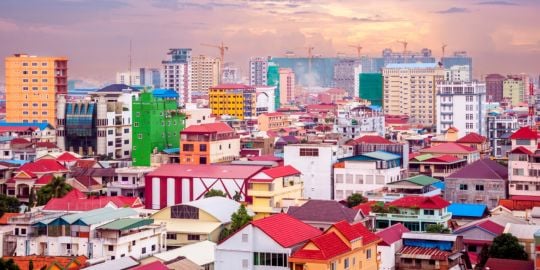Hi all my wife and I are thinking of moving to Cambodia and were wondering can you buy land in Cambodia we would like to build 3 small building to rent out say b&b
Can we as foreigners buy land in Cambodia? For commercial purposes
Not sure about the land (usually its not possible for foreigners to buy land, but others can confirm local conditions). The other part of the project you need to work out is you will need to start a business and set up a company to operate a B&B. Unfortunately when you live in a foreign country, its not the same rules and processes as living in the UK.
(Moderated : share your knowledge on the forum)
Information about this is freely available on the internet, for example:
Can foreigners buy Real Estate in Cambodia?
Yes, but with some restrictions...
Legislation passed at the beginning of April 2010 allows foreigners to own property in Cambodian buildings above the ground floor. This works well for apartments in condominiums or even older buildings in cities but not for a villa in a residential area except if you can manage to buy the upper floor.
The following options show how it is possible to buy almost anything.
Buying Real Property in Cambodia
Under Cambodian Land Law, foreign nationals cannot hold a 100% stake in real property within the Kingdom (except for the case above mentioned). However, legal mechanisms and documentation exist that allow foreigners to fully control the purchase, sale and use of real property in which they have invested, and benefit fully from any profits they make.
There are basically 5 Options for buying real estate and details of these follow.
Option 1: Forming a Company with a Cambodian Citizen
The safest method by which foreign nationals can purchase real property within Cambodia is to form a limited company in partnership with a Cambodian citizen. Any real property purchased for investment is then registered in the name of the company. The company must have a minimum 51% Cambodian shareholding. However, careful allocation of shares, and careful drafting of the rights attached to share certificates can ensure the foreigner's full control of the company and its assets. Additional mortgage, security and Power of Attorney documents can also be created to accompany ownership documentation. Following this procedure ensures security for the foreigner's investment.
Under this Option, the foreigner is expected to pay 100% of the purchase cost of real property plus any construction costs. If the real property is later sold, 100% of the sale price goes directly to the foreigner. This includes any profit accrued as a result of the property increasing in value. This issue should be detailed carefully in any company and/or sales documentation.
Of course the choice of your partners is of prime importance.
Option 2: Purchase plus long-term Rental
This method allows foreign nationals to purchase real property and register the Title Deed in the name of a Cambodian citizen. The foreigner and the Cambodian then enter into a long-term rental agreement by which the Cambodian citizen leases the property back to the foreigner. Lease periods can last up to 99 years.
The problem with this method, and why it has few takers, is the psychological attachment to freehold ‘ownership'. Most foreign investors expect full ‘ownership' of something they buy. The principal of renting back property that has already been purchased is an anathema to most foreigners.
However, correct drafting of the terms of the property holding and lease arrangements make this a reasonably secure method of controlling real property in Cambodia. Under this method, the foreigner may sell the property at any time and keep 100% of the revenue from the sale. The Cambodian citizen is not permitted to disagree with or obstruct the sale. The foreigner retains the original copy of the new Title Deed as a security precaution: sale of real property is impossible without the original copy of the Title Deed.
Though the foreigner can sell the property at any time, the Cambodian citizen's signature or thumbprint is generally required before any sale can take place. A good working relationship between both parties is therefore very important.
Option 3: Registering Real Property with a Cambodian Citizen
This method is very similar to Option 2 but requires 100% trust in the Cambodian citizen.
Foreign nationals have rights, under the Kingdom's Statutes, to choose a Cambodian in whose name their Title Deed is registered. That is, a foreign national can purchase property and register the purchased property in the name of the Cambodian citizen.
Once the Title Deed is transferred to the Cambodian citizen, the foreigner retains possession of the new Title Deed. This is a security precaution that protects the foreigner's interests by preventing the Cambodian citizen selling the land or property: sales are impossible without the Title Deed. Transferring the Cambodian's rights to the foreigner via a Mortgage or Lease Agreement provides additional security for the foreigner's investment.
Copies of the Title Deed and any Mortgage or Lease Agreements must be registered with the Department of Provincial Land Management, Urban Planning and Construction, as well as the appropriate District and central government departments that handle land registry. Most importantly, a copy of the Land Title and any Mortgage or Lease Agreements must be lodged with the Cadastral Land Registry Office.
The Cambodian citizen in whose name the Title is registered does not need to be resident in Cambodia. For example, the Title can be registered with a Cambodian citizen living in the USA or Australia. The Cambodian citizen must be able to prove Cambodian nationality.
Option 4: Marriage to a Cambodian National
Foreign buyers who are married to a Cambodian national can register real property using the name of their wife/husband on the Title Deed. It is also possible for a foreign national married to a Cambodian citizen and resident in the country for a long period to apply for Cambodian citizenship. In the event of citizenship being granted, Cambodian Law holds that land can be registered in the names of both parties. Neither partner can subsequently sell the land or property without mutual agreement.
In the event of divorce or separation, division of the land or property is dependent on the conditions under which divorce or separation takes place, and the decision of any court ruling or arbitration relating to the divorce. It is often source of conflict between the divorcees.
Option 5: Acquisition of Honorary Cambodian Citizenship
A foreigner may be granted honorary Cambodian citizenship if he or she donates a significant sum of money to the Royal Government of Cambodia for the purposes of benefiting the people of Cambodia. Foreigners who have made a special impact or rendered exceptional help to the Kingdom may also be granted this honor in recognition of their expertise or altruism.
One consequence of being granted honorary citizenship is that it becomes possible for a foreign national to acquire a 100% right of ownership over real property purchased within the Kingdom. This arrangement is recognized by the Ministry of Land Management, Urban Planning and Construction for the Kingdom of Cambodia, and by the Royal Government.
Honorary citizenship is recognized by the Royal Government of Cambodia as a legitimate means of purchasing real property within the Kingdom but it does not affect the foreigner's original nationality or citizenship in any way.
Wow thank you a lot to think about
Its about the same in most countries here. Plus a foreigner who wants to run a business needs to establish a commercial set up by being involved in a company of some kind. That area has similar approaches to the above in terms of partnerships, ownership, etc.
Hi Dave, There are some perpetual land leases available now. Before this became available you had to work with a National. Land would be bought with the National owning 51% and you 49%. Of course this would involve trust but could also be solved by presigned undated aggreement to sell contracts and other shananigans. Where did you want to buy? Ocean property or near the ocean is about $300 to $500. US a square meter. In my opinion it is best to establish a good friendship here with someone you trust as Khmers get many breaks in bussiness that us barongs dont get. Plus they understand the deep mysteries and pit falls of this wonderful land. They are also incredibly greatful when you give them a helping hand out of poverty if you find a good family. Hope this helps. Cheers Lawrance
Hi, I was very curious about the amount of money required to acheive status of option 5. Also you mention a consequence of option 5 being that you have the right to purshase property in Cambodia. My question is why is this a consequence? Useually the word consequence has a negative conotation? Is it a consequence to own property outright in the kingdom of Cambodia. Cheers Lawrance
Hi Dave, where in Cambodia would you want to do this? This is the bigger question IMHO, as your project must be feasible and your budget sufficient.
In regards to land ownership as a foreigner, it's "where there's a will there's a way". I do own several plots with a trusted local partner. Land ownership is a logical choice I feel, IF you can commit to Cambodia at least for the medium term and are not easily scared. The time to buy is now before prices move up more.
Hi Dave! Is you are interested at South-West part (Kampot/Kep) of Cambodia where still cheap plots (kind of <50$/sqm) close to the natural (secret) beach or even on the hills near by the sea, plz contact me.
I am a kind of expecting a team from Reunion (province part of France) in June to explore lands at these areas for some same sort of business you like to do.
Contact me for more detail. Cheers, Sovathana
Foreigners cannot own land in Cambodia, under Article 44 of the Constitution.
Nevertheless foreigners can establish control over land in four ways:
Land can be bought through a local company.
Land can be leased.
Acquiring Cambodian citizenship brings the right to buy land, a route actively encouraged by the government.
Land is sometimes bought through a Cambodian nominee, but this has been ruled to be against Constitution, and is unsafe.
Call it a long-term rental then - it certainly isn't illegal to rent to a foreigner. There will always be a solution and the ones interested in staying longer and setting up a nice place are usually the ones that Cambodia benefits from the most. A lot of money and ideas injected into the local economy and keeping people employed, perhaps even creation of new jobs.
Speaking of Kampot, Bluestar Real Estate has helped a lot of people with long term land rentals and they are trustworthy and have a good reputation, you can (and should) ask around who you are dealing with.
And yep, plenty of land in the lovely Kampot/Kep area. Prices in the Int'l village now starting at about $12/m2 - less in the boonies, much higher for water facing.









